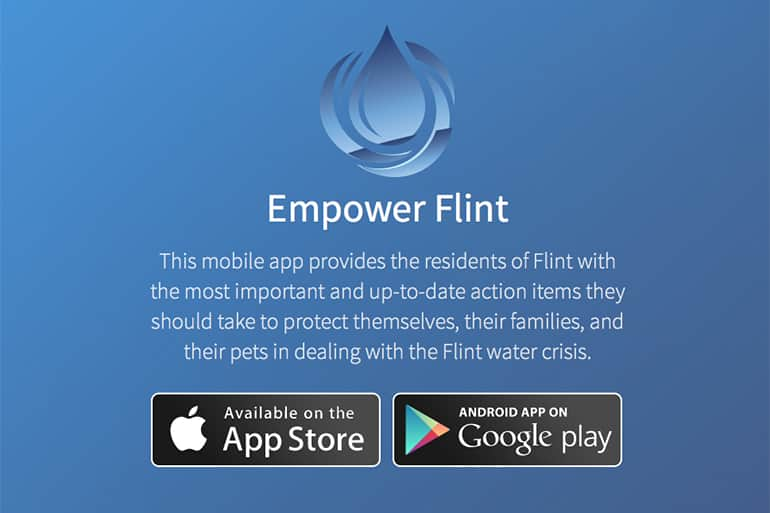Michigan State University and WKAR-TV have put the power of information in the hands of Flint residents through a new tool that navigates community resources in the wake of the ongoing water crisis.
The mobile app "Empower Flint" provides a checklist of important actions people can take to protect themselves, their families and pets as they battle elevated lead levels in the water supply. Released March 1, the app was developed by a team of researchers and specialists from MSU, the College of Communication Arts and Sciences, and WKAR-TV in collaboration with the people of Flint.
"Our goal was to build something that adapts to the needs identified by Flint residents, and that stands the test of time as community needs evolve," said Kami Silk, MSU associate dean for research and professor of communication and agbio research. "Our hopes are that the app will fill an information gap and be embraced as coming from a trusted and familiar voice in Flint: MSU."
The app's "find" operation enables users to search for the closest water stations, free water filters, lead testing sites, community events, and sources of nutritious food. Users will also find directional maps, news feeds, and volunteer and community activities at their fingertips. Most important, "Empower Flint" pushes out critical alerts about water safety, lead levels, and immediate steps that residents can take for personal and public health.
"We saw a lot of experts and community partners providing a lot of important information," said WKAR-TV Station Manager Susi Elkins. "Since we're communicators, we saw it as a chance to put our expertise to use for the greater good and devise a way to make communicating that information as easy as possible."
Associate Professor of Media and Information Brian Winn led the development of the app starting in mid-January with members of the College of ComArtSci's GEL Lab.
"The idea was to put as much Flint-related information as possible in the hands of users," said Winn. "We also set out to build in longevity and provide support for the long haul."
Developers say the university's strong presence in Flint will contribute to the app's sustainability. Working with the Flint branches of MSU Extension and the College of Human Medicine, Silk and Elkins assembled ongoing focus groups of residents to test and provide feedback the app.
Professor of Human Medicine Rick Sadler was among the partners helping developers connect with future app users. Since 2008, the public health expert has been working to provide healthy food options to Flint residents.
“The great thing about apps is that you can routinely push new info to the public, making it easier to stay up to date," Sadler said. "This is really important in our current situation, and this app is a way we can combine our efforts."
Elkins acknowledged that not everyone in Flint will have a smartphone to use the app, but reflected that at-risk communities tend to have mobile devices more than cable, TV or the Internet. Elkins said she and Silk will be working with community partners to identify a team of Flint residents to help roll out the app as well as to communicate information accessible through the app to people who don't have smartphones.
For one community member involved in app testing, that value of "Empower Flint" is already apparent.
"I have three kids with elevated lead in their blood," said the Flint resident. "Until I saw the app, I didn't know they were supposed to have increased calcium, so now I'll make sure they get more milk and cheese."
The "Empower Flint" app is available for both Android and Apple iOS smart phones and tablets, and can be found on Google Play and the Apple App Store. WKAR and the MSU College of Communication Arts and Sciences collaborated with a number of partners, including Central Michigan 2-1-1, MSU Extension, the colleges of Human Medicine and Veterinary Medicine, and the residents of Flint.
